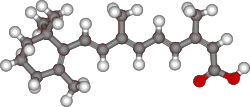 | |
 | |
| Clinical data | |
|---|---|
| Pronunciation | See note at tretinoin |
| Trade names | Accutane, Roaccutane, others[1] |
| Other names | 13-cis-retinoic acid |
| AHFS/Drugs.com | Monograph |
| MedlinePlus | a681043 |
| License data |
|
| Pregnancy category |
|
| Routes of administration | By mouth, topical |
| Drug class | Retinoid[2] |
| Legal status | |
| Legal status | |
| Pharmacokinetic data | |
| Bioavailability | Variable |
| Protein binding | 99.9% |
| Metabolism | Liver |
| Elimination half-life | 10–20 hours |
| Excretion | Kidney and fecal |
| Identifiers | |
| |
| Chemical and physical data | |
| Formula | C20H28O2 |
| Molar mass | 300.442 g·mol−1 |
| 3D model (JSmol) | |
| |
| |
| (verify) | |
Isotretinoin, sold under the brand name Accutane among others, is a medication primarily used to treat severe acne.[2] Specifically it is used for acne that is nodular and has not improved with other treatments.[2] Other uses include psoriasis, ichthyosis, and certain cancers.[2] It is taken by mouth or applied to the skin.[2][3]
Common side effects include inflammed lips, high blood triglycerides, joint pain, and muscle pain.[2] Other side effects may include sexual problems, increased susceptibility to sunburn, hair loss, and mental health problems.[3] Isotretinoin is known to cause birth defects and effective birth control is required starting a month before beginning treatment.[3] It is a retinoid, meaning it is related to vitamin A and tretinoin.[2] It is believed to work via altering sebaceous gland function.[2]
It was patented in 1969 and approved for medical use in 1982.[4] While it remains avaliable under a number of generic names the original brand name was discontinued in 2009 due to a combination of low sales and multiple lawsuits over side effects.[5] In the United States and United Kingdom special programs are in place to decrease the risk of women becoming pregnant while using the medication.[2][3] In the United Kingdom 20 mg per day for a month costs the NHS about 17 pounds.[3]
References edit
- ^ "Isotretinoin international brands". Drugs.com. Retrieved 1 June 2017.
- ^ a b c d e f g h i j k "Isotretinoin Monograph for Professionals". Drugs.com. Retrieved 5 October 2020.
- ^ a b c d e BNF 79. London: Pharmaceutical Press. March 2020. p. 1308. ISBN 978-0857113658.
- ^ Fischer, Jnos; Ganellin, C. Robin (2006). Analogue-based Drug Discovery. John Wiley & Sons. p. 476. ISBN 978-3-527-60749-5.
- ^ DeNoon, Daniel J. "Acne Drug Accutane No Longer Sold". WebMD. Retrieved 5 October 2020.